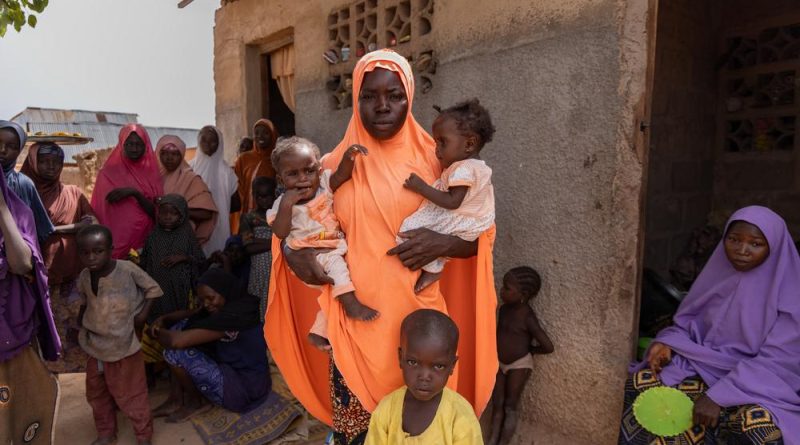Acute Food Insecurity May Hit Nigeria,17 Other Countries
By Bukar BOLORI
Acute food insecurity is set to increase in magnitude and severity in 18 hunger “Hotspots”, among them Nigeria, a new United Nations early warning report has revealed.
The report released on Wednesday spotlighted the urgent need of assistance to prevent famine in Gaza and the Sudan, and further deterioration in the devastating hunger crises in Haiti, Mali, and South Sudan.
It also warned of the lingering impact of El Niño and the looming threat of La Niña that risks bringing further climate extremes that could upend lives and livelihoods.
The report found that many hotspots face growing hunger crises and highlights the worrying multiplier effect that simultaneous and overlapping shocks are having on acute food insecurity, conflict, climate extremes, and economic shocks continue to drive vulnerable households into food crises.
The report warned that 2023 is likely to mark the first year since 2010 in which humanitarian funding has declined compared to the previous year, but it still represents the second highest funding level ever for humanitarian assistance.
FAO Director-General, QU Dongyu said: “The daunting prospects highlighted in this report should serve as a wake-up call to all of us. We need to spearhead the shift from responding to crises after they occur to more proactive anticipatory approaches, prevention and resilience building to help vulnerable communities cope with upcoming shocks. Acting ahead of crises can save lives, reduce food shortages and protect livelihoods at a much lower cost than a not timely humanitarian response.”
On his part, the WFP Executive Director, Cindy McCain: “Once a famine is declared, it is too late – many people will have already starved to death. In Somalia in 2011, half of the quarter of a million people who died of hunger perished before famine was officially declared. The world failed to heed the warnings at the time and the repercussions were catastrophic. We must learn the lesson and act now to stop these hotspots from igniting a firestorm of hunger,” adding that: “We have proven solutions to stop these crises in their tracks, but we need the resources and the political will to implement them at scale before more lives are lost.”
The report – ‘Hunger Hotspots – FAO-WFP early warnings on acute food insecurity’ – issued on Thursday by the Food and Agriculture Organisation of the United Nations (FAO) and the United Nations World Food Programme (WFP) called for urgent humanitarian action to save lives and livelihoods and prevent starvation and death in 18 hotspots – comprising a total of 17 countries and one regional cluster of four countries (drought-affected Malawi, Mozambique, Zambia and Zimbabwe) – where acute hunger is at a high risk of worsening from June to October 2024.
The report said the ongoing conflict in Palestine is expected to further aggravate already catastrophic levels of acute hunger, with starvation and death already taking place, alongside the unprecedented death toll, widespread destruction and displacement of nearly the total population of the Gaza Strip.
In mid-March 2024, famine was projected to occur by the end of May in the two northern governorates of the Gaza Strip, unless hostilities ended, full access was granted to humanitarian agencies, and essential services were restored. Over one million people – half the population of Gaza – are expected to face death and starvation (IPC Phase 5) by mid-July.
The report also warned of broader regional ramifications of the crisis, which risk exacerbating the already high food security needs in Lebanon and the Syrian Arab Republic.
The report stated that conflict and displacement also continue at an alarming pace and magnitude in the Sudan, where time is running out to save lives and the lean season looms, with the outlook for food production is bleak, and there is a rapidly shrinking window to support farmers before the main planting season ends and the rains begin, limiting access to the hardest-hit communities.
Since the previous edition of the Hunger Hotspots report (October 2023), the Central African Republic, Lebanon, Mozambique, Myanmar, Nigeria, Sierra Leone and Zambia have joined Burkina Faso, Ethiopia, Malawi, Somalia and Zimbabwe in the list of hunger hotspots, where acute food insecurity is likely to deteriorate further during the outlook period.
The report provides concrete country-specific recommendations on priorities for anticipatory action and immediate emergency response to address existing and emerging needs to save lives and ensure predictable hazards do not become full-blown humanitarian disasters.
The report stated that immediate humanitarian action delivered at scale will be critical to prevent further starvation and death – particularly in Mali, Palestine, South Sudan, the Sudan and Haiti.
But the report warns that to effectively address and prevent famine, emergency agriculture – in addition to emergency food and cash assistance – must be provided in a balanced manner.
Additionally, more investments are needed in integrated solutions across multiple organizations that can help to meaningfully tackle food insecurity and reduce reliance on emergency food assistance.




